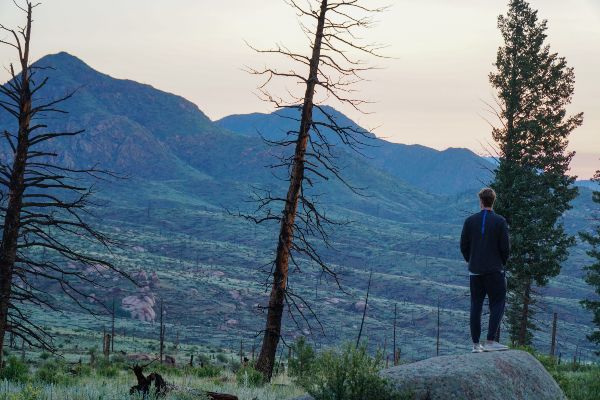Isn’t environmentalism just a progressive fad? Aren’t the threats overblown? Didn’t Pope Francis just jump on this socio-political bandwagon? The answer to all these questions is “no.” But they are reasonable questions. There are a lot of different ideas about and motivations for caring for the environment; some of them are not compatible with the Faith.
Sometimes environmentalists do overstate things. And, certainly, Francis gave a prominence to concern for the environment by writing an entire encyclical on it – though it is worth noting that both Saint John Paul II and Benedict XVI had addressed the issue in detail in their own writings. As early as 1987, St. John Paul devoted a section in his encyclical Sollicitudo Rei Socialis to “respect for the beings which constitute the natural order,” insisting that we “cannot use with impunity” any part of God’s creation and that we “must take into account the nature of each being and of its mutual connection within an ordered system” (34). He went on to write an entire letter on the topic. As for Benedict, he was dubbed “the Green Pope” due to his attentiveness to ecology, flowing forth from his love for his native Bavaria. I note some of his writings below.
Underneath these questions lies a more fundamental one: What does the environment have to do with the Catholic faith?

The abuse and subsequent deterioration of creation should be seen as part of a larger problem in society; it is symptomatic of the rejection of the very existence of a Creator God. To illustrate this, let’s look at two key concepts presented by our popes that make this connection.
The first comes from Benedict XVI. The “Green Pope” teaches in his encyclical Caritas in Veritate that creation has a “grammar” that is prior to us. Just like the grammar of language, we can employ language in creative ways, but there are ingrained rules for use – not abuse – that we must follow. Benedict insists that this key idea links Christian sexual teaching to stewardship for the environment: in both cases, there is preexisting grammar, or criteria, that we need to follow, or else we do violence to the good at hand. He writes importantly, “The book of nature is one and indivisible,” criticizing those who don’t cooperate with this natural grammar of the environment and those who don’t follow this natural grammar of human sexuality (51). In both cases, the root cause of chaos, exploitation, and violence is the same: a refusal to acknowledge that there is a Creator God who made us and everything that exists according to His beautiful order, or “grammar.”
The second concept is one Francis identifies as the heart of society’s problem: the “technocratic paradigm”, as the Holy Father names it in Laudato Si’. In his encyclical letter, Francis contrasts the way mankind perceived and interacted with creation for the vast majority of history with this “technocratic paradigm”. Up until very recently, peoples and cultures lived in harmony with creation; their disposition involved “being in tune with and respecting the possibilities offered by the things themselves. It was a matter of receiving what nature itself allowed, as if from its own hand” (106). In contrast, increasingly throughout the past couple of centuries, our disposition now involves seeing creation as “something formless, completely open to manipulation,” and hence we attempt “to extract everything possible from [created goods] while frequently ignoring or forgetting the reality in front of us” (106). This “technocratic paradigm” is present in any situation where we simply impose our will on the God-given reality before us.
We see the technocratic paradigm frequently rear its ugly head in our “throwaway culture,” a culture which treats everything as disposable. The technocratic paradigm is as visible in abortion and mutilating “gender-reassignment” surgeries as it is in factory farms or mountaintop removal mining. As Pope Francis notes later in the encyclical, “learning to accept our body, to care for it and to respect its fullest meaning, is an essential element of any genuine human ecology,” and this includes “valuing one’s own body in its femininity or masculinity” (155). What applies to humans also applies to all of God’s created order: there are humane ways, for example, to raise chickens and use cows, and do exactly what Francis describes, namely, respect their nature as chickens and cows.
As with Pope Benedict’s instruction on grammar, the technocratic paradigm carefully demonstrates that there is a proper way to employ nature with respect, in accordance with reality – and this applies throughout all of creation, from our own bodies to the creatures around us to our common home and its resources. The key to flourishing, for ourselves and for nature, is to recognize and honor the order God has imprinted into everything. We work with it, not against it.

You might object to this: what does any of this have to do with Scriptural instruction on morality? And what does it have to do with the seemingly thousands of decisions environmentalists urge to make? More good questions! The first question takes a couple chapters of my book, Walking God’s Earth: The Environment and Catholic Faith, to answer. Some essential highlights to keep in mind are:
- The creation narrative in Genesis is about a created order of wholly good things – nothing is made “bad” in creation.
- The end of biblical revelation depicts “a new heaven and a new earth” – not an image of the destruction of present creation, but the renewal and perfection of it, as sung in Psalm 104 which we hear on Pentecost Sunday, praising God for pouring out his Spirit and renewing the face of the earth.
- Between these two bookends, the rest of Scripture contains lots and lots of instruction, both in the Old and New Testaments, about limiting our desires for worldly pleasures and possessions – and this is possibly the biggest, single step our world could take to improve our care for the environment.
As for the second question, there is a real challenge in sorting through the personal choices that have the biggest impact. Environmental problems can really be sorted into two kinds: acute and chronic. Like the use of hard drugs, some environmental problems involve lethal poisons polluting or even destroying our resources. We’ve actually done a pretty good job as a society working on these – our water is much cleaner than it was 50 years ago, the chemicals causing a hole in the ozone layer have been eliminated, and scrubbers on power plants helped save Eastern forests from acid rain.
But other environmental problems are akin to obesity, lack of exercise, or smoking: they are chronic, and involve ongoing behaviors that are, eventually, unsustainable. The problems Francis highlights in Laudato Si’ – such as carbon emissions, running out of water, and making species extinct – belong to this second class; they tend to involve doing too much of something, and, across time, the “too much” wrecks the whole system.
Let’s be clear: we can put some carbon into the atmosphere, just not too much to upset the balance. We are much less competent in addressing these types of problems, in part because (unlike obesity or smoking) the real damage will be foisted upon our great-grandchildren, who may very well inherit a world much harsher and far less bounteous than the one we take for granted. As Catholic Christians, we are used to thinking about the importance of children; we need to do better in thinking about their children’s children. That means, most of all, focusing on modifying our actions related to those big things: rebalancing the amount of carbon in the atmosphere, for example, or buying goods that involve a sustainable use of forest resources.
It becomes immediately obvious that these large problems need some society-wide rule-setting to move things in the right direction. That doesn’t mean everything promoted as “green” really is green; sadly, quite the contrary in some cases! But hopefully we can move forward, informed by our Faith, and make impactful choices that are consistent with our responsibility to steward and reverence God’s beautiful order, rather than abuse it.
